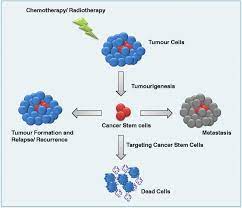Introduction:
The journey through cancer is a challenging one, marked by resilience, hope, and often, the specter of recurrence. In this comprehensive blog post, we will explore the nuances of cancer recurrence, drawing insights from authoritative sources such as the National Cancer Institute (NCI), Mayo Clinic, American Cancer Society, Cancer Research UK.
1. NCI: Unveiling the Landscape of Cancer Recurrence
The National Cancer Institute (NCI) is a stalwart in cancer research, offering valuable insights into the complexities of cancer recurrence. According to NCI, refers to the return of cancer cells after the completion of treatment. Understanding the factors contributing to recurrence is essential for individuals navigating the post-treatment phase.
Risk Factors and Prevention Strategies:
NCI outlines various risk factors influencing cancer recurrence, emphasizing the importance of ongoing monitoring and survivorship care. By addressing modifiable risk factors such as lifestyle choices and adhering to follow-up appointments, individuals can actively participate in reducing the likelihood of recurrence.
Embracing Survivorship:
The NCI encourages a survivorship-focused approach, highlighting the significance of survivorship care plans. These plans, tailored to individual needs, encompass post-treatment monitoring, physical and emotional well-being, and guidance on healthy living. Embracing survivorship is integral to empowering individuals to navigate life beyond cancer diagnosis and treatment.
2. Mayo Clinic: In-Depth Insights into Cancer Recurrence
Mayo Clinic, renowned for its medical expertise, offers an in-depth exploration of cancer recurrence, covering its intricacies and potential preventive measures.
Types of Cancer Recurrence:
Mayo Clinic delineates local recurrence, regional recurrence, and distant recurrence as the three primary types. Understanding these distinctions is crucial for individuals and healthcare professionals to tailor treatment plans effectively. The clinic provides detailed information on the characteristics and management of each recurrence type.
Diagnostic Imaging and Monitoring:
Mayo Clinic underscores the importance of diagnostic imaging in detecting cancer recurrence. Regular monitoring through imaging techniques allows for early identification of recurrent tumors, enabling prompt intervention and improved outcomes.
Psychological Impact and Coping Strategies:
Addressing the psychological impact of cancer recurrence is paramount. Mayo Clinic acknowledges the emotional toll and offers coping strategies, emphasizing the role of support networks, counseling, and open communication with healthcare providers in fostering resilience during the recurrence journey.
3. American Cancer Society: Navigating the Challenges of Recurrent Cancer
The American Cancer Society (ACS) provides a dedicated resource on dealing with cancer that comes back, acknowledging the unique challenges individuals face when confronted with recurrence.
Understanding Recurrence Risk:
ACS delves into the factors influencing recurrence risk, including the type of cancer, initial treatment success, and individual health. This comprehensive understanding allows individuals to proactively manage risk factors and engage in informed discussions with their healthcare team.
Treatment Options and Clinical Trials:
ACS explores various treatment options for recurrent cancer, from standard therapies to participation in clinical trials. The organization recognizes the potential of research in advancing treatment modalities and provides information on accessing clinical trials through resources like ClinicalTrials.gov
Emotional Support and Coping Mechanisms:
Dealing with cancer recurrence requires a multidimensional approach. ACS emphasizes the importance of emotional support, offering guidance on coping mechanisms, support groups, and survivorship resources. Empowering individuals to navigate the emotional landscape is integral to fostering resilience.
4. Cancer Research UK: Advancements in Understanding and Prevention
Cancer Research UK, a leading force in global cancer research, contributes to the discourse on cancer recurrence, focusing on progress and prevention strategies.
Advancements in Research:
The organization highlights ongoing research initiatives aimed at deepening the understanding of cancer recurrence mechanisms. By staying abreast of these advancements, individuals and healthcare professionals can anticipate breakthroughs in prevention, early detection, and targeted therapies.
Preventive Measures and Lifestyle Choices:
Cancer Research UK underscores the role of lifestyle choices in preventing cancer recurrence. From maintaining a healthy diet to regular exercise, individuals are encouraged to embrace proactive measures that contribute to overall well-being and potentially reduce the risk of recurrence.
Supporting Ongoing Research through ClinicalTrials.gov:
Acknowledging the pivotal role of clinical trials in shaping the future of cancer treatment, Cancer Research UK directs individuals to [ClinicalTrials.gov. The website serves as a gateway for exploring trials related to cancer recurrence and innovative therapeutic approaches.
5. ClinicalTrials.gov: Paving the Way for Future Solutions
ClinicalTrials.gov stands as a dynamic platform facilitating access to a myriad of clinical trials, including those addressing cancer recurrence.
Search for Cancer Recurrence Trials:
Individuals keen on exploring cutting-edge treatments and preventive strategies for cancer recurrence can leverage the search functionality on ClinicalTrials.gov. By entering keywords such as "cancer recurrence," users gain access to a diverse
array of trials spanning different cancer types and interventions.
Patient-Centric Information and Participation:
ClinicalTrials.gov adopts a patient-centric approach by providing clear and accessible information about each trial. Understanding the eligibility criteria, potential benefits, and risks empowers individuals to make informed decisions about participating in trials that align with their needs and goals.
Contributing to Medical Advancements:
Participation in clinical trials not only offers potential benefits to individual patients but also contributes to the collective advancement of medical science. By actively engaging in research, individuals become integral to the process of developing more effective prevention and treatment strategies for cancer recurrence.
Conclusion: Empowering Individuals Beyond Cancer Treatment
Cancer recurrence introduces new challenges to individuals who have traversed the initial stages of diagnosis and treatment. Understanding the nuances of recurrence, from risk factors to coping mechanisms, empowers individuals to navigate this complex phase with resilience and knowledge.
By drawing insights from authoritative sources such as NCI, Mayo Clinic, ACS, Cancer Research UK, and ClinicalTrials.gov, individuals can gain a deeper understanding of cancer recurrence and access valuable resources to support them on their journey beyond cancer treatment.



No comments yet